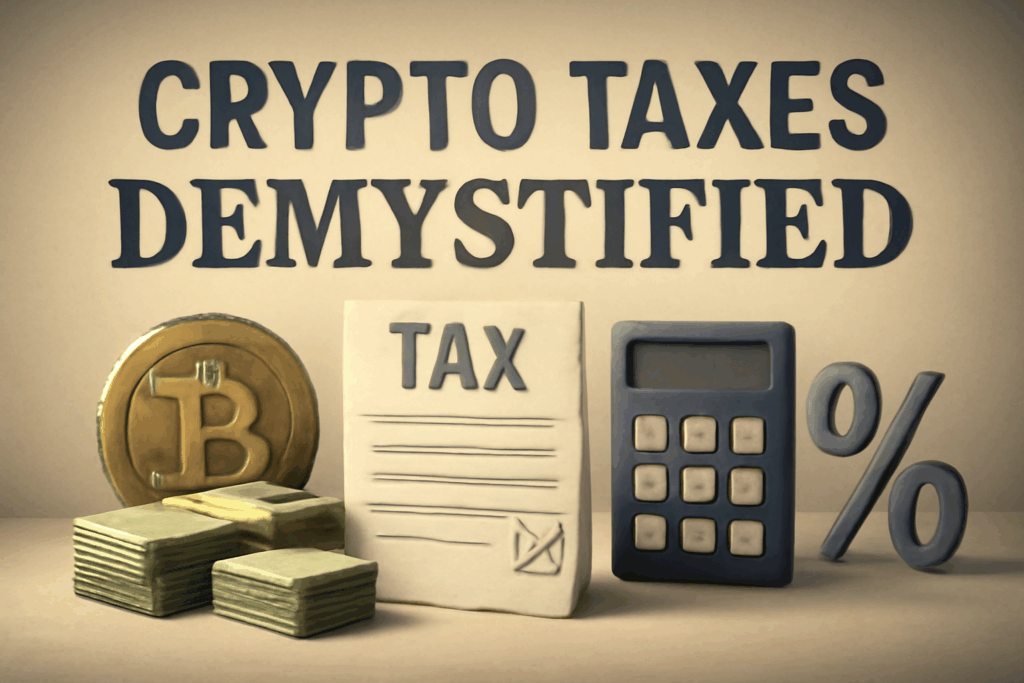You have bought some Bitcoin. Perhaps you traded some Ethereum. Maybe you even tried staking your tokens. The crypto journey is exciting. It offers many new ways to grow your wealth. But with excitement comes responsibility. One big area is taxes. Crypto taxes can seem scary. Many people feel lost. They are unsure how to report their digital assets.

This confusion is normal. Traditional tax rules did not cover crypto. Governments are now catching up. New rules are always emerging. Ignoring these rules is risky. It can lead to penalties. Nobody wants that kind of trouble. So, understanding crypto taxes is vital. We will break down the basics for you. We will make it simple. You will learn what actions matter. You will also learn how to track them.
Think of it like this. You earn money from a regular job. You know you pay taxes on that. Crypto earnings are similar. They are often seen as property. Or they are seen as income. This depends on what you do. The rules vary by country. But the core idea is often the same. You owe taxes on your gains. This guide will help you understand. It will help you stay compliant. You can enjoy your crypto journey. You can do it without fear.
We will cover the main events. These events can trigger a tax obligation. We will explain them clearly. You will also get practical tips. These tips help you manage your records. Good record-keeping is your best friend. It makes tax time much easier. Let us clear up the confusion. Let us make crypto taxes understandable for everyone.
What Makes Crypto Taxable? Understanding Taxable Events
So, what exactly triggers a tax event? This is the first big question. For many, it is not just buying crypto. Holding crypto usually is not a taxable event. The tax trigger happens when you use it. It happens when you dispose of it. Let us look at common scenarios.
Selling Crypto for Fiat Currency: This is the most common event. You sell Bitcoin for US Dollars. This creates a capital gain or loss. You pay tax on gains. You can deduct losses. This is just like selling stocks. It is simple to understand.
Trading One Crypto for Another: Many people do this. You swap Ethereum for Solana. This also counts as a taxable event. You dispose of Ethereum. You acquire Solana. The value of Ethereum at that moment matters. This creates a gain or loss. Even if no fiat money is involved, it counts. This surprises many users. Always track these trades.
Using Crypto to Buy Goods or Services: You buy a coffee with Bitcoin. Or you pay for a flight with ETH. This is also a taxable event. You are spending crypto. The IRS (or your local tax authority) sees it as selling. You sell your crypto. Then you use the fiat value. This creates a capital gain or loss. Track the value at the time of purchase.
Earning Crypto Income: This category is broad. It includes many activities.
- Receiving Crypto as Payment: You get paid in Bitcoin for work. This is ordinary income. It is taxed just like salary.
- Staking Rewards: You stake your ADA. You earn more ADA. These rewards are income. They are taxed when you receive them. The fair market value matters.
- Mining Rewards: You mine Bitcoin. You earn BTC. This is also ordinary income. The value at the time you receive it counts.
- Airdrops: You receive free tokens. These are often income. They are taxed at their fair market value. This happens when you get control of them.
- Lending Crypto: You lend your USDC. You earn interest. That interest is ordinary income. It is taxed when you receive it.
- DeFi Yield Farming: Earnings from various DeFi protocols. These are often income. They can be complex to track.
Each of these actions can generate a tax obligation. It is crucial to track them all. Even small transactions add up. Ignoring them can cause issues. We will discuss tracking tools soon. But for now, understand these triggers. They are the core of crypto tax rules. Knowing them is your first step. It is a big step towards compliance.
